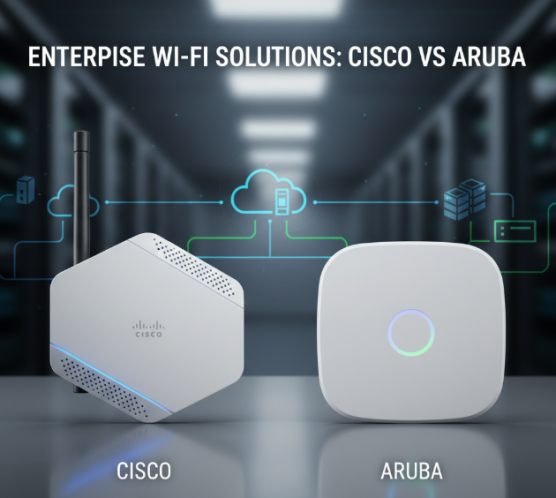Choosing the right enterprise wireless solution is critical for maintaining secure, high-performing, and scalable WiFi infrastructure. CIOs, CTOs, and IT leaders often debate Cisco vs Aruba when designing or upgrading networks. Understanding their strengths, management tools, and ecosystem integrations can help make the best choice for your organization.

Cisco vs Aruba: Key Considerations
When evaluating Cisco vs Aruba, consider these primary factors:
1. Network Performance and Coverage
- Cisco: Offers robust performance for large-scale deployments, with advanced features like AI-driven assurance and flexible roaming.
- Aruba: Known for adaptive radio management and excellent coverage in high-density environments.
- Tip: Map your physical layout and user density to determine which system supports your coverage needs most efficiently.
2. Management and Monitoring Tools
- Cisco: Uses Cisco DNA Center, offering centralized management, analytics, and policy automation.
- Aruba: Employs Aruba Central, a cloud-native platform simplifying deployment, monitoring, and troubleshooting.
- Tip: Choose a solution that aligns with your team’s familiarity and operational workflow.
3. Security and Compliance
- Cisco: Strong enterprise security with integration to Cisco ISE for identity-based access control.
- Aruba: Offers integrated security features like dynamic segmentation and role-based access.
- Tip: Align your wireless choice with internal security policies and compliance requirements.
4. Ecosystem and Integrations
- Cisco: Extensive ecosystem with existing Cisco switches, routers, and security products.
- Aruba: Seamless integration with HPE hardware and hybrid IT environments.
- Tip: Consider your current IT stack to minimize integration complexity.
Making the Right Enterprise Wireless Choice
To decide between Cisco and Aruba, follow a structured approach:
| Factor | Cisco | Aruba | Recommendation |
|---|---|---|---|
| Performance | High scalability | Adaptive coverage | Match to user density |
| Management | DNA Center | Aruba Central | Choose based on team skills |
| Security | ISE integration | Dynamic segmentation | Align with compliance needs |
| Ecosystem | Cisco products | HPE/hybrid IT | Consider existing infrastructure |
FAQs
1. Which is better for large enterprise networks?
- Cisco typically excels in large-scale, high-performance environments due to advanced AI-driven features.
2. Can Aruba handle high-density areas effectively?
- Yes, Aruba’s adaptive radio management optimizes coverage and performance in dense office spaces.
3. Do both solutions support cloud management?
- Yes, Cisco DNA Center and Aruba Central both offer centralized management, but Aruba Central is fully cloud-native.
4. How do security features compare?
- Cisco integrates with ISE for identity-based access; Aruba offers dynamic segmentation and role-based access policies.
5. Which platform is easier for teams without Cisco experience?
- Aruba Central tends to be more intuitive for teams new to enterprise wireless, thanks to its cloud-first interface.
6. Can I integrate either solution with existing IT infrastructure?
- Both integrate well, but Cisco aligns best with Cisco networking gear, while Aruba fits seamlessly into HPE or hybrid IT environments.
Soft CTA
Choosing the right wireless solution is a strategic decision. Partnering with experts like OmniLegion can ensure your Cisco vs Aruba evaluation aligns with performance, security, and scalability goals. Explore our case studies to see real-world implementations and contact us for tailored guidance.

